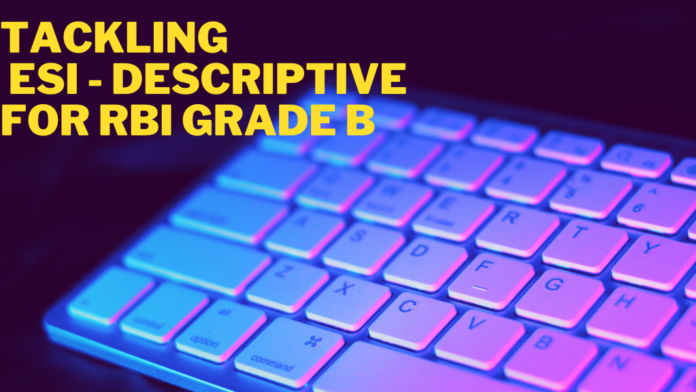Since the change in the format of the examination, the strategy for preparation of ESI also needs a re-look. With inclusion of descriptive answers, it has become more complex and demanding.
Let us first understand what are the different traits essential for attempting this paper in a satisfactory manner.
- Ability to comprehend any subject and examine it in the light of facts.
- Ability to give a neutral perspective.
- Ability to express in limited words.
- Ability to be creative.
- Ability to remember facts and ability to reproduce.
Whenever we are writing any answer it has mainly two parts:
- Facts and statements
- Arguments
Facts and statements can be of two types ; static like definitions (eg: structure of finance commission in India) and dynamic like Current affairs (latest distribution of taxes by Finance commission).
Based on these facts we make arguments, and in case if we don’t then these are mostly hollow arguments which has limited to negative impact.
So, basic strategy would be to build your base of “facts and statements”. First, develop a certain way of thinking by examining those facts regularly, and then do writing practice as much as you can.
Let’s discuss what all sources which can be used for ESI
1-For basics in economics you can follow these NCERT books and follow up with standard books on Indian economy like Ramesh Singh or Uma Kapila. A good reading of Ramesh Singh improves your chances significantly.
2- For Economic affairs you can follow PIB (and its yearly analysis), Vikaspedia, Arthpedia, News on Air, Business Line and Live Mint. Apart from this budget document and Economic survey is also important. Discussions on Rajya/Lok Sabha TV and Explainer videos on YouTube will help. If you remember topics from your syllabus, you will be able to find out what is important from the point of view of examination. Visions monthly current affairs is also a good source.
3- RBI Website
How to do writing practice?
In the initial weeks, you shall practice writing informative/fact-based answers. You can develop your own set of question bank , like for example, the syllabus has a topic called “Balance of Payments” . On this topic you can yourself make some fact based questions like, “What do you understand by Balance of Payments and how it is different from Balance of Trade?” or “ Describe the items involved in BOP calculation” or “Narrate the trend of BOP and Forex reserve in India.”
At a later stage once you are comfortable with the topic you can make opinion/examination based questions, like, “Suggest ways to improve BOP in India?”, or “How BOP impacts Forex reserves in India. ” or “Do you think export promotion method in India are serving their purpose?”.
Remember that in case of RBI examination the typing speed is the key and it should match with flow of thoughts in your brain. Plus, it has a word limit of 400/600 words per answer which is hardly two pages. This makes is further difficult as writing with small word limit is extremely difficult. So, it makes practice even more important.
Peer assessment
Finding a good coaching which can give assessment of your answers is difficult in RBI Grade B examination. So, peer review comes in handy, make a small group of 4-5 like minded students and keep on sharing your answers with each other for assessment. Coachings may be useful if they provide regular assessment.
Time line
Overnight development of writing skill is near to impossible. On an average you shall start your preparation for mains at least 6 months in advance. Because, for writing you need to develop Thinking.
Thinking is the hardest work there is, which is probably the reason so few engage in it.
Henry Ford, American industrialist and founder of Ford Motor Co.




